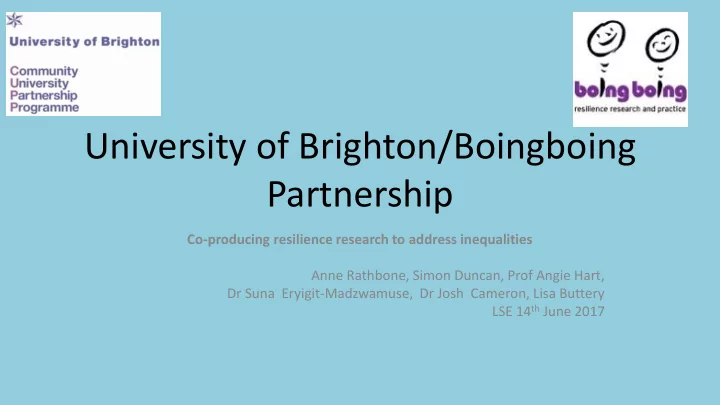

University of Brighton/Boingboing Partnership Co-producing resilience research to address inequalities Anne Rathbone, Simon Duncan, Prof Angie Hart, Dr Suna Eryigit-Madzwamuse, Dr Josh Cameron, Lisa Buttery LSE 14 th June 2017
Overview • The University of Brighton/boingboing partnership • Why take an inequalities approach to resilience? • How we take an inequalities approach • What it looks like • Conclusions
UoB/boingboing partnership • Boingboing established as CIC by Prof Angie Hart and Kim Aumman in 2005 • Vehicle for for co produced resilience research and knowledge exchange • Aim - to model, promote and deliver co-produced resilience research and practice through effective knowledge exchange, through an equalities approach • Activity based on Resilient Therapy approach and Resilience Framework • “Beating the odds and changing the odds”
Resilience Framework
Why an inequalities approach to resilience? • There has been an increasingly ecological approach to resilience over its life span • However, criticisms of the study of resilience, and its application to social policy, remain …
Critiques of a focus on resilience • “A focus on resilience cannot adequately explain inequalities in [health] and wellbeing and may serve to disguise or distract from analysis of social structures that result in and maintain inequalities in power, wealth and privilege ” ( Friedli, 2012) • “the individualised […] notion of resilience […]obscures historical and more recent structural inequalities that are fundamental barriers to the wellbeing of the poor and blames and penalises them for what are […] deemed to be their failings, deficits and unhealthy dependencies” (Bottrell, 2012) • “ putting a sticking plaster over the wound caused by macro-structural inequalities in power and resources” ( Taylor, Mathers, Atfield &Parry, 2011)
Our inequalities approach • Based on pragmatist philosophy – a post neo-liberal approach to resilience • An overarching critical approach that acknowledges importance of individual resilience, within context of systems change and addressing social inequalities that create and maintain adversity contexts • Brings resilience research and practice development together with activism explicitly to unite resilience work with social justice values “Resilience is overcoming adversity, whilst also potentially subtly altering, or even dramatically transforming, (aspects of) that adversity ” or in other words: “Beating the odds whilst also changing the odds”. 2016 Hart et al. Uniting Resilience Research and Practice With an Inequalities Approach, SAGE Open, Vol 6, Issue 4
How we take an inequalities approach 1. By targeting our research to enable greater understanding of issues for people whose needs are currently under represented in research literature 2. By using co-productive methods that amplify the voice of lived experience in research and knowledge exchange 3. By focusing on social transformation across eco-systems 4. By embracing sustainability - encouraging involvement of those with lived experience after research project end A democratic learning community (development) approach
Addressing inequalities Diversity Knowledge (changing the odds) /Inclusion exchange Boingboing/ UoB Partnership Research Co-production Respect
University of Brighton/Boingboing partnership – a community of interests and experience with a common aim Academic Lived research experience Practitioner Co-researcher Core Boingboingers
Examples of our recent work • Natural Environment Research Council (NERC), Patterns of resilience among young people in a community affected by drought: Historical and contextual perspectives. 2016 • Imagine project – international partnership research on resilience approaches • Headstart Blackpool - £10 million Lottery funded 5 year strategic programme 2016 • Arts and Humanities Research Council (AHRC), Co-designing Resilience. • Fiona Deane (private philanthropist), Co-developing resilience tools 2016 • Economic and Social Research Council (ESRC): IMAGINE: The social, historical, cultural and democratic context of civic engagement: imagining different communities and making them happen 2013 to 2017 • European Commission EU grant, STYLE project 2013 to 2016
What our equalities research approach looks like in practice …
Assisting with delivery as trained co-researchers/peer researchers
Co-creating resilience promoting materials
Embedding evidence based resilience practice across a whole local system
Influencing research direction, social policy and practice - promoting opportunities for agency & social activism
Conclusions • Boingboing is vehicle for promoting an equalities approach to research through university /community co-production • Research focus includes individual resilience, within context of addressing social inequalities that create and maintain adversity contexts • Brings resilience research and practice development together with activism explicitly to unite resilience work with social justice values • Synergy between diverse knowledge, skills and experiences and multiple identities
References • 2012 Winter, S., Buttery, L., Gahan, L., Taylor, S., Gagnon, E., Hart, A., & Macpherson, H. (2012) Visual arts practice for resilience: a guide for working with young people with complex needs . Brighton: Boingboing. • 2015 Hart, A., Macpherson, H., Heaver, B., Gagnon, E. (2015) Using Visual Arts Based Approaches to Develop Young People’s Resili ence in Kourkoutas, E., Hart, A. (Ed.) Innovative Practice and Interventions for Children and Adolescents with Psychosocial Difficulties and Disabilities (pp. 415-430). Newcastle: Cambridge Scholars Publishing. ISBN (10):1-4438-7250-4. • 2015 Macpherson, H., Hart, A., & Heaver, B. (2015) ‘Building resilience through group visual arts activities’: findings from a scoping study with young people who experience mental health complexities and/or learning difficulties.’ Journal of Social Work, 0(0) 1-20, DOI: 10.1177/1468017315581772 • 2016 Hart,A., Gagnon,E., Eryigit-Madzwamuse,S., Cameron,J. , Aranda,K., Rathbone,A., Heaver,B. Uniting Resilience Research and Practice With an Inequalities Approach ,SAGE Open, Vol 6, Issue 4, DOI: 10.1177/2158244016682477 • 2012 Winter, S., Buttery, L., Gahan, L., Taylor, S., Gagnon, E., Hart, A. , & Macpherson, H. (2012) Visual arts practice for resilience: a guide for working with young people with complex needs . Brighton: Boingboing. • 2015 Macpherson, H., Hart, A. , & Heaver, B. (2015) ‘Building resilience through group visual arts activities’: findings from a scoping study with young people who experience mental health complexities and/or learning difficulties.’ Journal of Social Work, 0(0) 1-20, DOI: 10.1177/1468017315581772 • Website: www.boingboing.org.uk • Blog about our work with South African colleagues: http://www.boingboing.org.uk/co-researching-drought-south-africa-blog/ • Short film on resilience: TEDx:http://www.youtube.com/watch?v=XPUzjyAoOK4 • More about the work of Boingboing through the eyes of young people: www.youtube.com/watch?v=bH_OXhKdWhQ
Recommend
More recommend